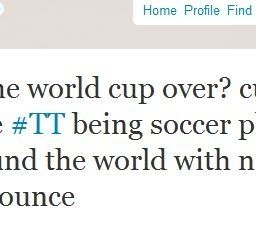The final game of the World Cup is tomorrow, an offline event that has the potential to shut down Twitter with the amount of online traffic it generates. Not that shutting down Twitter is much of a feat these days, considering how often I see the Fail Whale on a daily basis, but it’s still notable.
A few news stories have been published about the online impact of the World Cup. it’s especially interesting for fans in the U.S. Until recently soccer was primarily seen as a cult interest for sports fans in the United States, while it’s a way of life for fans pretty much everywhere else in the world. Due in part to the U.S. Soccer team’s decent performance in the competition this year, but also due to real time-global communications tools like Twitter, many United States sports fans actually participated in the global conversation about the World Cup. Anecdotally, I noticed some resentment among some U.S. Twitter users who stated their exasperation with the World Cup talk dominating Twitter conversation for the past month.
I noticed a similar pattern last year, and a couple of weeks ago, with the BET Awards, when for one Sunday evening, all of Twitter’s trending topics were dominated by hip-hop and R &B artists or other random musings about black popular culture. Last year’s BET awards discussion seemed to take some Twitter users by surprise and the resulting commentary turned nasty and at times racist. Since then the “news” of black Twitter users seems to have become more accepted, but there seems to always be a disruptive element whenever the “mainstream” of Twitter conversation (tech stuff, social media, Justin Bieber, celebrity death news) is temporarily silenced by unexpected conversation from a seemingly “niche” audience.

Of course, that is the curious power of a medium like Twitter, so driven by real-time conversation and offline events that people want to talk about. It’s not just the large, impactful, meaningful events that become part of the conversation, like the Iran elections, or the Gulf oil spill, but more mundane happenings, like a cable TV awards show, or the anniversary of an album, or whatever. Audiences – very different types of audiences, defined by behavior, nationality, fandom, age, you name it – use the tool to connect and talk about whatever is current and discussion-worthy, even if its not of universal interest.
These diverse conversations get little moments of awareness each day on Twitter, sometimes they take hold long enough in trending topics to be noticed by “outsiders” of the community having the conversation, which is when things get interesting. In the case of the World Cup it showed the potential for a truly global conversation to take place, and even bring “outliers” along for the ride. I think this is the headed toward being the standard now, understanding that the assumed audience of social media, and of Twitter specifically, is much more diverse than we are always aware of. As we see communications on Twitter allow for translation capability in the future (please?) hopefully we will see the opportunity and chaos of even more diverse conversation and community online







[…] This post was mentioned on Twitter by Keidra, Antoinette Authedna. Antoinette Authedna said: It's good, too! RT @kdc: i wrote a new Learned Fangirl post: http://ow.ly/29IML […]
[…] Cup: When Cultures – and Subcultures – Collide on Twitter by The Learned Fangirl on July 10, […]
[…] we reach the end of the World Cup, I figured it would be a good time to look back at the social media impact of the games, as I did four years […]